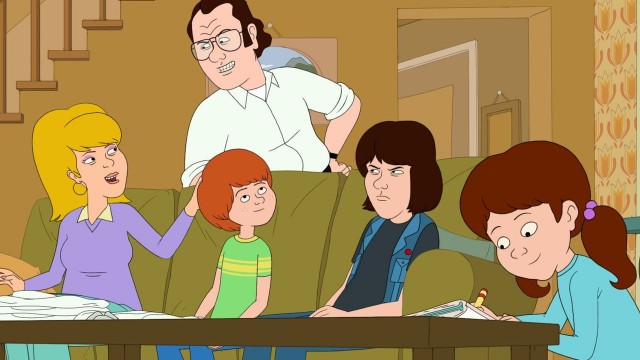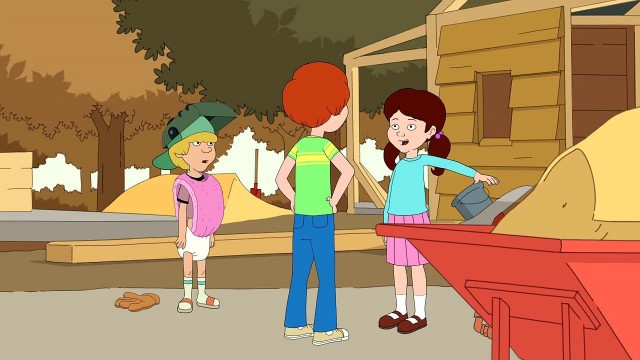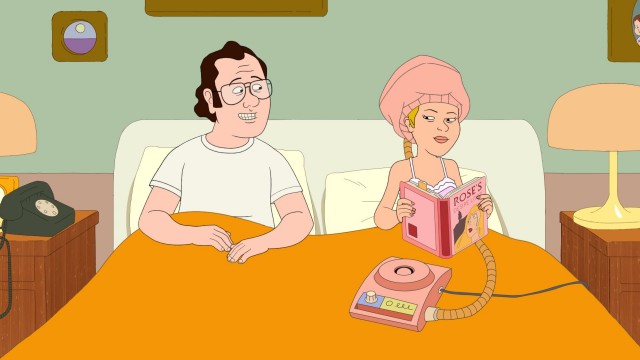NOTE: This review may contain mild spoilers for the debut season of ‘F is for Family’. That said, the review is written to accommodate those who have not yet seen the season, and as such, will avoid any discussion of major plot developments.
Boy, family life sure is different compared to around forty years ago, wasn’t it? That seems to be what F is for Family, Netflix’s newly-released animated sitcom, wants to highlight, particularly in regards to how much more politically correct our society has become. Back in the 70’s, it was perfectly acceptable to threaten your kids with violence, smoke wherever you wanted, and mouth off to salesmen, among other things that definitely wouldn’t be tolerated today, and F is for Family glorifies all of those things and more. That’s not to say that life was better back in the 70’s, but it did seem to be a bit more brutally honest.
Brutal honesty is another thing that F is for Family prides itself on, as it takes a Married… With Children-esque examination of the fictional Murphy family, circa 1973. Well, they’re partially fictional anyway. Some of the jokes and family dynamics are inspired by the childhood life of comedian, Bill Burr, who already has a stand-up special or two available on Netflix. Burr is the main driving force behind the show, alongside co-writer and co-executive producer, Michael Price, both of whom created the series to give Netflix another darkly comic animated show, only one more nostalgic and grounded than the more surreal, forward-thinking BoJack Horseman. Rounding things off is a production deal with Vince Vaughn’s TV label, Wild West Television, on top of the hands-off freedom of Netflix, ensuring that the series is as raw and edgy as possible.
If you enjoy shows that aren’t afraid to bluntly and continually admit that life as a spouse and parent can be pretty damn miserable at times, F is for Family is probably for you. Its subjects are definitely not perfect people, with each having their own clear-cut shortcomings and limitations. Even young children, Maureen and Bill (no doubt a caricature of Bill Burr’s real child self) have their share of issues, with Maureen being a reckless tomboy, and Bill being a downtrodden wimp who is desperate to stand up to his regular bully. Some of these conflicts have definitely been touched upon in other shows, but F is for Family at least has the advantage of effectively contrasting a harsher family life and parenting style with gentler, more forthcoming modern parenting that seems to be prevalent today.
Like I said though, even if F is for Family fondly looks back at a more honest, unrestrained time, it also highlights how some of the Murphy children are victims, simply because they’re ahead of their time in some ways. The oldest child, Kevin is the biggest example, as Kevin is clearly a closet nerd with a taste for fantasy, which he at least tries to make cool and edgy by listening to fantasy-themed rock music. Because of the convention of the day however, Kevin is seen as a loser, and that leads to him responding to his situation by failing out of school, and getting high all day. Had Kevin been fourteen years old in the present day, he’d probably be an honour student.
The same is true of Maureen, someone who would clearly benefit from the modern woman-esque style of thinking in the present day. Even as recently as the 70’s, tomboys were seen as weirdos and outcasts, and this leads to Maureen’s response of constantly trying to push the envelope, and get herself into trouble. She wants to prove that she’s tough, and sees her greatest obstacle as simply being female. This is brilliantly illustrated during the debut season’s Halloween episode, when Maureen tells patriarch, Frank that she wants to go as a character called Mr. Coconut, which Frank refuses to allow, simply because Mr. Coconut is not a female character. This wouldn’t be a big deal today, but back then, it was seen as a slippery slope to allow girls to pretend to be boys, in any context.
So, what simple answers does F is for Family provide then? Well, it acknowledges that there are none. Yes, people were more proud and strong in the 70’s, but that didn’t always lead to good things for youth or adults alike. Even then though, F is for Family also denounces the overly delicate parenting and disposition of people in the present day, almost appearing to declare it social cowardice. It’s a fine example of brash, edgy humour that almost goes out of its way to offend, but it’s only offensive because of how apparently soft people have gotten today. Had this show been released in the actual 70’s, somehow, it would probably be more accepted and widely appreciated. That’s the funny irony that F is for Family plays with very well, and that’s when it’s often at its funniest.
With that said however, this doesn’t change the fact that so-called ‘modern’ folks who are easily offended and upset by what they would perceive as ‘damaging’ family life, will probably find the show draining, annoying, or, naturally, offensive. True, the show is almost mocking those people, but that definitely doesn’t make them a target audience. Instead, this first six-episode season of F is for Family seems to be aimed squarely at people who are just as frustrated as Bill Burr as to how weak-kneed people have apparently become in the present day. It tells those people that their pain is felt, and maybe if classic parenting convention was allowed to blend itself with more modern wisdom, it might produce something closer to a perfect family unit, rather than one that has simply swung in the opposite direction in regards to people’s personalities and triggers in the modern era.
It’s not just the children that get put under this microscope either. The adults of the Murphy family are also examined to good effect here, particularly Frank Murphy, who is voiced by Bill Burr himself. You can tell that Burr is drawing on some undeniable nostalgia with his portrayal of Frank, no doubt inspired by his real-life father, from his fictional father’s apparent obsession with violent, hyper-masculine television cop, Colt Luger (a fictional character that seems to be an amalgam of ‘man’s man’ television cops of the era), to his trademark threat of, “Putting you through that wall”, whenever one of the kids steps out of line. By today’s standards, Frank is probably going to be seen as a brute, but that doesn’t necessarily make him a nasty parent. He never hits his children for example (despite the aforementioned wall-flavoured threats), and always sticks up for his family whenever someone else tries to insult them. Frank has undeniable anger issues, especially by today’s standards, but he’s not without honour and principles, which makes him a television father that the right people can ultimately root for, trotting upon that careful Al Bundy-esque line of likability and aggression.
Another feather in F is for Family’s cap is that it does a good job of explaining why Frank, along with his wife, Sue, tend to have the personalities that they do. The show’s very intro sums up in less than a minute how Frank ended up where he is, taking us through a guided tour of disappointment that ultimately plummets Frank into his present family unit, complemented very well by a rather ironic playing of Redbone’s, “Come and Get Your Love” over it. A blue-collar worker who is torn between looking after his family and being loyal to his co-workers, one of the major carrying arcs of this season has Frank desperately trying to save his job by preventing a strike that could collapse the airline he works at. It’s a good arc that nicely highlights the common challenges of a family patriarch in the 70’s, particularly with blue-collar jobs being far more common back then, and having far less safety nets. Contributing to the lack of easy answers is that Frank’s ultimate resolution for this debut season doesn’t quite end the way that you think it will, giving F is for Family a surprising amount of heartfelt dramatic weight, even when it would outwardly appear to simply be a brash comedy.
Frank’s struggles also bleed into his dealing with his wife, Sue, a bored homemaker that tries to pursue her own occupation of selling tupperware around town. Sue, much like her children, is a well-meaning person that sometimes feels like a victim of the times, since she’s desperate to find meaning in a society that is doing everything it can to keep women in the kitchen at this point. The ERA hadn’t really come to prominence yet, further contributing to the irony of Sue only being a few short years away from really being able to embrace being her own woman, without simultaneously sacrificing her family’s well-being, simply because Frank isn’t equipped to do anything outside of his job. Things were more clear-cut back then, but they were also less flexible, another way that F is for Family provides a good contrast between the good and the bad of past and present.
Given the shortened six-episode format, which has F is for Family feeling much more like a webseries than the Netflix comedies that came before it, there isn’t all that much time to get to know the supporting cast of the show, who are largely given shallow, one-note jokes. The six-episode format for Season One isn’t a bad idea, since it prevents the show from becoming unfocused or overwhelming, though it also means that the Murphys’ world doesn’t see any other arcs or perspectives at this point. The only supporting character that really registers in fact is the Murphys’ neighbour, Vic, voiced in a standout turn by Sam Rockwell, who is perpetually easygoing and always in a good mood, having looks, money and women in spades. This leads to Frank resenting Vic pretty openly, though Vic never seems to pick up on it. Vic’s a pretty inspired character overall, and he’s well-placed in the series, to sometimes show audiences how Frank can occasionally be the source of his own misery, even when he also has plenty of outside excuses to be miserable.
Ultimately, F is for Family’s first season manages to cut through the misery to find some true, and sometimes even hilarious, laughs, and the fact that the show manages some surprisingly effective drama and heart at times, means that it starts off better than the majority of animated sitcoms do in their first season, including BoJack Horseman, which had a shakier debut season itself back in 2014. That said though, the show could still improve, with a handful of refinements. The biggest of these is perhaps a tad more balance between comedy and drama. Sometimes, it feels like F is for Family is simply swinging from one to the other at any given moment, rather than offering a balanced degree of both. It’s not a dealbreaker, but it goes to show that F is for Family can still get better, if it gets a second season.
And it should get a second season. F is for Family is a good show, which is smartly made and boldly defiant of the self-made shortcomings behind many modern family-driven sitcoms. The tightly-focused six-episode format keeps things simple, and the Murphy family is ultimately likable, even given how nasty and loud they can be. That was how it was though, and F is for Family doesn’t shy away from that. Like all good comedies, the show isn’t afraid to challenge what many people perceive to be acceptable and proper in the modern era, and trust me when I say that it really doesn’t give a shit about your trigger warnings, for what that’s worth.






